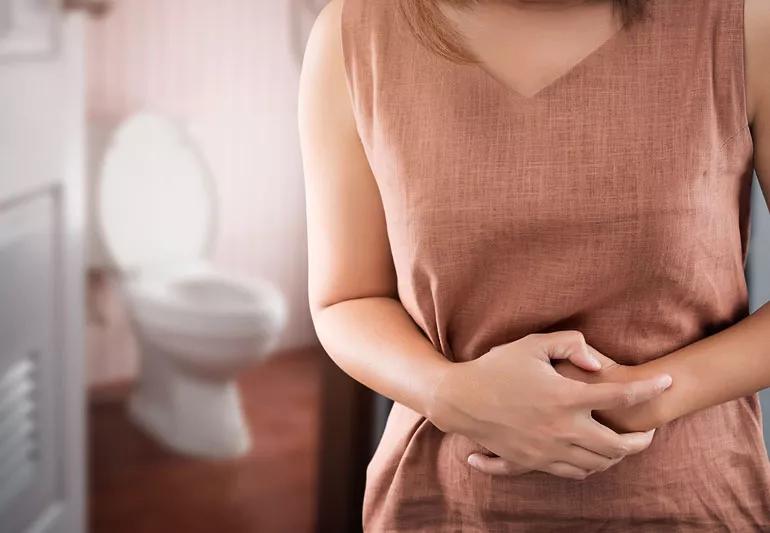Why you experience tummy troubles during your menstrual cycle

It’s that time of the month, and with it come a few side effects that you could do without: constipation, bloating, diarrhea… maybe even all of the above.
Advertisement
Cleveland Clinic is a non-profit academic medical center. Advertising on our site helps support our mission. We do not endorse non-Cleveland Clinic products or services. Policy
Many people have mild, manageable digestive distress related to their menstrual cycle. For others, it’s more severe.
Regardless of your symptoms, family medicine physician Donald Ford, MD, MBA, Chairman of the Department of Family Medicine at Cleveland Clinic, shares steps you can take to manage period poops and other cycle-related stomach issues.
Blame it on hormones. Each month, just before your period begins, fatty acids known as prostaglandins begin to relax the smooth muscle tissues inside your uterus to help it shed its lining.
But those same prostaglandins can have a similar impact on your bowels, leading to — you guessed it — more poop, and even diarrhea.
“It makes sense if you think of the cycle,” Dr. Ford says. “Until ovulation, the uterus is preparing to accept the egg and, once it starts, the opposite happens — it’s cleansing to get ready for the next cycle.”
For people with existing digestive issues such as irritable bowel syndrome and Crohn’s disease, period-related poop problems may be more severe.
Another period-related hormone, progesterone, can cause diarrhea in some people and constipation in others.
Progesterone is responsible for the growth and thickening of the uterine walls, and it peaks right before ovulation. A buildup of the hormone can cause bowel issues.
Advertisement
“Progesterone typically promotes constipation, which tends to come around ovulation or a couple of days after,” he says.
Some of the other abdominal symptoms you experience around your period aren’t related to your digestive system at all. During menstruation, the hormones that your body releases hormones can cause:
“While these symptoms may feel like they’re taking place in your stomach, they’re actually happening in the uterus,” Dr. Ford explains.
Hormones happen, and no matter what you do, you probably can’t prevent a little bit of stomach trouble related to your periods. But you can take steps to lessen them and to take care of your tummy.
The first line of defense for digestive issues is a healthy diet.
“Eat healthy food and get plenty of natural fiber,” Dr. Ford says. “Some people also take fiber supplements, but there’s some controversy over whether or not those are effective.”
Eat plenty of fruits, vegetables and leafy greens to maintain regular bowel habits. And try not to indulge those pre-period junk food cravings, which can further your upset stomach and cause extra-smelly stool and gas.
Diarrhea can lead to dehydration, a loss of water and nutrients from your body’s tissues — which can become a serious problem if left unaddressed.
If you’re prone to loose stool come that time of the month, stay hydrated by drinking lots of water. And avoid coffee, if you can, which has a laxative effect that you just don’t need right now.
Taking ibuprofen right before the start of your period may prevent the release of prostaglandins, thus easing the pain of your period and your period poops. Just be sure to carefully follow the dosage instructions.
For constipation, Dr. Ford recommends taking a gentle brand like MiraLAX® or stool softeners to relieve constipation as needed. If your constipation is chronic, prescription medications such as linaclotide or lubiprostone may offer an effective solution.
If your digestive issues become debilitating, your doctor may recommend oral contraceptives that reduce the frequency of your periods. If you’re already taking contraceptives, one option is to skip periods by skipping the week of placebos.
“It doesn’t fix the problem, but it makes it happen less frequently,” Dr. Ford says.
It’s a good idea to talk to your doctor if you have major symptoms like severe cramping with your period, he says. Also, if you ever have pain accompanied by blood in your stool, see your physician as soon as possible to rule out more serious problems.
Advertisement
Learn more about our editorial process.
Advertisement

These substitutes for tampons and pads can be a great option for lower cost, lower carbon footprint and longer wear times

Stress, PCOS, perimenopause or hyperthyroidism may cause a low flow

Pads are a low-effort option for period management and come in different absorbencies, materials and shapes

Fluctuating hormones, water retention and a change in habits can cause temporary weight gain

Stress can cause light, late or nonexistent periods — which may eventually create a hormonal imbalance

Your period typically gets darker as the days go on, starting out pink and changing to red, dark red and even brown

Foods with iron, antioxidants and fiber can help you feel your best

If you wash regularly and change your underwear as needed, this can be a safe (and liberating) alternative to pads and tampons

Wearing a scarf, adjusting your outdoor activities and following your asthma treatment plan can help limit breathing problems

Your diet in the weeks, days and hours ahead of your race can power you to the finish line

When someone guilt trips you, they’re using emotionally manipulative behavior to try to get you to act a certain way